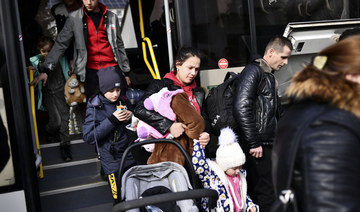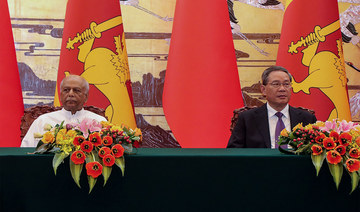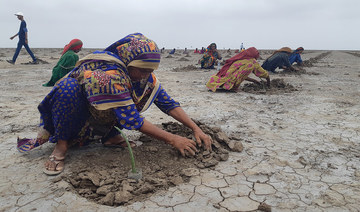In the aftermath of Russia’s invasion of Ukraine, the fog of war is extending to those who are trying to help the beleaguered Ukrainians.
With ports blocked and roads made treacherous by bombings, charities currently can’t send humanitarian aid into Ukraine through normal channels, though both countries agreed Thursday to create corridors to allow those donations to be delivered. The International Committee of the Red Cross has expressed worry that Russian attacks being carried out in densely populated areas are imperiling children, the sick and the elderly.
Yet the complexities of the conflict haven’t stopped aid from reaching Ukrainians. The United Nations says much of the humanitarian effort are now based in neighboring countries to support roughly 1.4 million Ukrainians who have fled the country, mostly to Poland, Hungary and Romania. But charities are also working to send aid to Ukraine itself.
The scale of need is enormous. On Tuesday, the United Nations issued an appeal for $1.7 billion to help with aid efforts, estimating that 12 million people in Ukraine and 4 million refugees could be in need of relief and protection in the coming months.
Filippo Grandi, chief of the UN refugee agency, said his agency had already received more than $40 million in private donations from individuals and companies.
Many corporations have committed to help. Amazon pledged $5 million to the UN’s refugee agency and other humanitarian organizations and plans to match up to $5 million more in donations made by its employees. Snapchat announced $15 million for humanitarian support. Airbnb offered free housing” to up to 100,000 refugees and is waiving its fees on the grassroots movement of people booking stays in Ukrainian homes, with no plans of using them, to get money quickly into the accounts of hosts. And Binance, the world’s largest cryptocurrency exchange, has pledged $10 million toward aid.
Cryptocurrencies donations themselves have emerged as a leading form of aid. Samuel Bankman-Fried, CEO of the cryptocurrency exchange FTX, said his company gave $25 to “each Ukrainian” on FTX.
“Do what you gotta do,” he wrote.
Elliptic, a company that tracks cryptocurrency transactions, said that as of Friday, $56.2 million in digital currencies had been donated to Ukraine’s government and to Come Back Alive, a Ukrainian organization that says it trains and supplies ammunition to Ukraine’s military.
Come Back Alive is set to receive support from a crypto fundraising campaign, Ukraine DAO, that was organized in part by the punk protest group Pussy Riot. The organizer tweeted Wednesday they had raised just over 2,258 ether, equivalent to about $6.7 million.
“This is the first time that we’re seeing sort of a public concerted effort to raise funds to finance an ongoing conflict through cryptocurrency,” said Chris DePow, a regulation and compliance expert at Elliptic.
Inevitably, scammers appear to be trying to profit off the crisis. Elliptic said in a blog post that it had identified crypto fundraising scams that solicited aid for Ukraine.
“If the funds are being raised directly by the government through a publicly announced appeal, or if the funds are being raised through a third-party reputable organization that’s known to be active in this space, that’s probably a safer bet,” DePow said.
As of Wednesday, Meta said, more than $20 million had been raised on its Facebook and Instagram platforms for nonprofits that support humanitarian aid.
Maria Genkin, a board member with the American nonprofit Razom, which was established to help Ukrainians after Russia’s 2014 invasion and annexation of Crimea, said her group has generated donations through their Facebook and Instagram fundraisers to send supplies to Poland.
The usual delivery trucks and other shipping methods, Genkin said, have either been halted or made more dangerous by the war. So supporters are building their own system.
“It’s a system of volunteers essentially crowdsourcing delivery,” she said. “There will be a lot of private cars bringing supplies from Warsaw to Lviv.”
Razom says it would prefer that people donate directly to the Ukrainian Armed Forces through an account opened by the National Bank of Ukraine. But Genkin said she recognizes that many nonprofits cannot give directly give to the military because of tax restrictions and that many donors may object to funding another country’s armed forces.
For that reason, Razom will continue to collect donations for humanitarian aid for Ukraine. It also plans to raise awareness for campaigns to create a no-fly zone over Ukraine and upcoming protests, including one Saturday in New York’s Times Square.
“We’re finding a lot of little things that we can do that add up to big things,” Genkin said.
That’s Nova Ukraine’s plan as well. The American nonprofit, which provides humanitarian aid and raises awareness of Ukrainian issues in the United States, initially planned to collect clothing and other aid and ship it to the country. However, with Ukraine’s ports cut off by Russian forces, that is no longer an option. Igor Markov, one of Nova Ukraine’s directors, said the group will work to send what they have collected to Ukrainian refugee camps in neighboring countries, as well as prepare for ongoing refugee support.
Elsewhere in the US, the Jewish organization UJA-Federation of New York spent the past month preparing for different scenarios with its Ukrainian partners, some of whom had been storing two to three months’ worth of food as a precaution. Once the invasion occurred, said Deborah Joselow, the group’s chief planning officer, the federation managed to quickly deploy $3 million in emergency grants to provide humanitarian support and other aid to roughly 200,000 Jews living in Ukraine.
The initial grants are slated to help their partners — at least 15, with many more affiliates — provide food and medicine for the elderly, Holocaust survivors, people with disabilities and other vulnerable populations. The organization said it’s been receiving inquiries from community activists and others who have taken shelter in bunkers in Odessa and in metro stations across Ukraine.
“They’re scared,” Joselow said. “They’re really, really scared.”
Charities struggle to deliver humanitarian aid into Ukraine
https://arab.news/rdqer
Charities struggle to deliver humanitarian aid into Ukraine
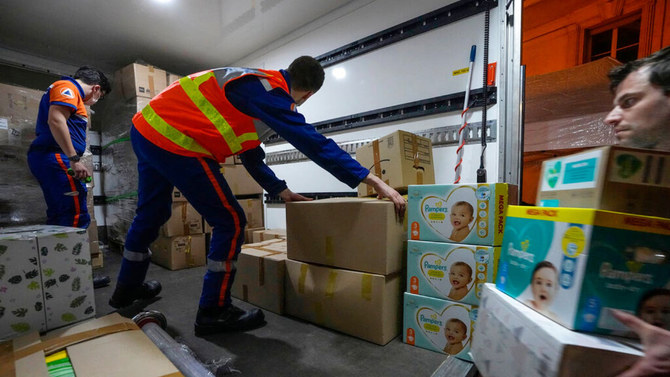
- With ports blocked and roads made treacherous by bombings, charities currently can’t send humanitarian aid into Ukraine through normal channels
Fake videos of Modi aides trigger political showdown in India election

- Indian police arrest nine people for circulating fake video of Indian Home Minister Amit Shah
- With more than 800 million Internet users, tackling misinformation in India is a huge challenge
BENGALURU/LUCKNOW: Manipulated videos are taking center stage as campaigning heats up in India’s election, with fake clips involving two top aides of Prime Minister Narendra Modi triggering police investigations and the arrest of some workers of his rival Congress party.
In what has been dubbed as India’s first AI election, Modi said last week fake voices were being used to purportedly show leaders making “statements that we have never even thought of,” calling it a conspiracy “to create tension in society.”
Indian police — already investigating the spread of fake videos showing Bollywood actors criticizing Modi — are now investigating a doctored online clip that showed federal home minister Amit Shah saying the ruling Bharatiya Janata Party will stop certain social guarantees for minorities, a subject sensitive for millions of voters.
Shah retorted on X, posting his “original” and the edited “fake” speech and alleging — without providing any evidence — that the main opposition Congress was behind the video it created to mislead the public. The minister said “directions have been issued to the police to address this issue.”
Indian police arrested at least nine people, including six members of Congress’ social media teams, in the states of Assam, Gujarat, Telangana and New Delhi last week for circulating the fake video, according to police statements.
Five of the Congress workers were released on bail, but the most high-profile arrest made by the cybercrime unit of New Delhi police came on Friday, when they detained a Congress national social media coordinator, Arun Reddy, for sharing the video. New Delhi is one region where Shah’s ministry directly controls police. Reddy has been sent into three-day custody.
The arrest has sparked protests from Congress workers with many posting on X using the #ReleaseArunReddy tag. Congress lawmaker Manickam Tagore said the arrest was an example of “authoritarian misuse of power by the regime.”
Congress’ head of social media, Supriya Shrinate, did not respond to messages and an email seeking comment.
MISINFORMATION
India’s election from April 19 to June 1 will be the world’s largest democratic event. With nearly a billion voters and more than 800 million Internet users, tackling the spread of misinformation is a high stakes job. It involves round-the-clock monitoring by police and election officials who often issue take down orders to Facebook and X as investigations start.
In India’s most populous state of Uttar Pradesh, more than 500 people keep tabs on online content, flagging controversial posts and coordinating with social media companies for their removal when needed, police chief Prashant Kumar told Reuters on Saturday.
Another fake video that sparked a storm last week showed Yogi Adityanath, the state’s chief minister, criticizing Modi for not doing enough for families of those who died in a 2019 militant attack. Though fact checkers said the video was created using different parts of an original clip, state police called it an “AI generated, deepfake.”
Using Internet address tracking, state police arrested a man named Shyam Gupta on May 2 who had shared the fake video post on X a day earlier, receiving over 3,000 views and 11 likes.
The police have accused Gupta of forgery and promoting enmity under Indian law provisions that can carry a jail term of up to seven years if convicted. Reuters could not reach him as he is currently serving a 14-day custody period.
“This person is not a tech guy. Had he been tech savvy, arresting him quickly would not have been possible,” said police officer Kumar.
Australian police shoot boy dead after stabbing with ‘hallmarks’ of terrorism

SYDNEY,: Australian police said on Sunday they had shot dead a boy after he stabbed a man in Western Australia’s capital Perth, in an attack authorities said indicated terrorism.
There were signs the 16-year-old, armed with a kitchen knife, had been radicalized online, state authorities said, adding they received calls from concerned members of the local Muslim community before the attack, which occurred late on Saturday night.
The attack, in the suburb of Willetton, had “hallmarks” of terrorism but was yet to be declared a terrorist act, police said.
“At this stage it appears that he acted solely and alone,” Western Australia Premier Roger Cook told a televised press conference in the state capital Perth, regarding the attacker.
The victim, stabbed in the back, was stable in hospital, authorities said.
Prime Minister Anthony Albanese said he had been briefed on the incident by police and intelligence agencies, which advised there was no ongoing threat.
“We are a peace-loving nation and there is no place for violent extremism in Australia,” Albanese said on social media platform X.
The incident comes after New South Wales police last month charged several boys with terrorism-related offenses in investigations following the stabbing of an Assyrian Christian bishop while he was giving a live-streamed sermon in Sydney, on April 15.
The attack on the bishop came only days after a stabbing spree killed six in the Sydney beachside suburb of Bondi.
Gun and knife crime is rare in Australia, which consistently ranks among the safest countries in the world, according to the federal government. (Reporting by Sam McKeith in Sydney; Editing by Christian Schmollinger and William Mallard)
North Korea’s UN ambassador says new sanctions monitoring groups will fail
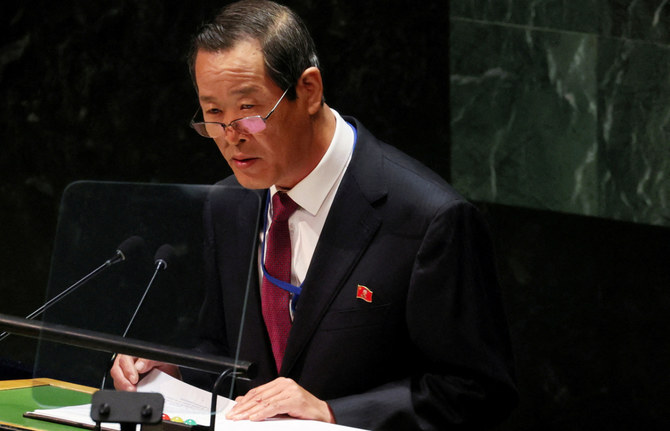
- Earlier this year, Russia vetoed the annual renewal of a panel of experts amid US-led accusations that North Korea has transferred weapons to Russia for use in its war in Ukraine
SEOUL: Efforts led by the US and other Western countries to form new groups to monitor sanctions on North Korea will fail, the country’s UN envoy said on Sunday, according to state media KCNA.
Ambassador Kim Song made the comment in response to a joint statement the US and its allies issued this week calling to continue the work of a UN panel of experts monitoring longstanding sanctions against Pyongyang for its nuclear weapons and missile programs.
Earlier this year, Russia vetoed the annual renewal of the panel amid US-led accusations that North Korea has transferred weapons to Russia for use in its war in Ukraine.
“The hostile forces may set up the second and third expert panels in the future but they are all bound to meet self-destruction with the passage of time,” KCNA quotes Kim as saying in a statement.
Last month, US Ambassador to the United Nations Linda Thomas-Greenfield visited the Demilitarized Zone, a heavily fortified border between the two Koreas, which remain technically at war and urged Russia and China to stop rewarding North Korea for its bad behavior.
Her trip came after Russia rejected the annual renewal of the multinational panel of experts that has over the past 15 years monitored the implementation of UN sanctions aimed at curbing North Korea’s nuclear and missile programs.
China publicizes for the first time what it claims is a 2016 agreement with Philippines

- The move threatens to further raise tensions in the disputed waterway, through which much of the world’s trade passes and which China claims virtually in its entirety
TAIPEI, Taiwan: For the first time, China has publicized what it claims is an unwritten 2016 agreement with the Philippines over access to South China Sea islands.
The move threatens to further raise tensions in the disputed waterway, through which much of the world’s trade passes and which China claims virtually in its entirety.
A statement from the Chinese Embassy in Manila said the “temporary special arrangement” agreed to during a visit to Beijing by former president Rodrigo Duterte allowed small scale fishing around the islands but restricted access by military, coast guard and other official planes and ships to the 12 nautical mile (22 kilometer) limit of territorial waters.
The Philippines respected the agreement over the past seven years but has since reneged on it to “fulfill its own political agenda,” forcing China to take action, the statement said.
“This is the basic reason for the ceaseless disputes at sea between China and the Philippines over the past year and more,” said the statement posted to the embassy’s website Thursday, referring to the actions of the Philippines.
President Ferdinand Marcos Jr. and Duterte have denied forging any agreements that would have supposedly surrendered Philippine sovereignty or sovereign rights to China. Any such action, if proven, would be an impeachable offense under the country’s 1987 Constitution.
However, after his visit to Beijing, Duterte hinted at such an agreement without offering details, said Collin Koh, senior fellow at the S. Rajaratnam School of International Studies based in Nanyang Technological University, Singapore and an expert on naval affairs in the Indo-Pacific region, particularly Southeast Asia.

“He boasted then that he not only got Chinese investment and trade pledges, but also that he secured Philippine fishermen access to Scarborough Shoal,” Koh said, referring to one of the maritime features in dispute.
Beijing’s deliberate wording in the statement “is noteworthy in showing that Beijing has no official document to prove its case and thus could only rely mainly on Duterte’s verbal claim,” Koh said.
Marcos, who took office in June 2022, told reporters last month that China has insisted that there was such a secret agreement but said he was not aware of any.
“The Chinese are insisting that there is a secret agreement and, perhaps, there is, and, I said I didn’t, I don’t know anything about the secret agreement,” said Marcos, who has drawn the Philippines closer to its treaty partner the US “Should there be such a secret agreement, I am now rescinding it.”
Duterte nurtured cozy relations with Chinese President Xi Jinping during his six-year presidency while openly being hostile to the United States for its strong criticism of his deadly campaign against illegal drugs.
While he took an almost virulently anti-American stance during his 2016 visit to Washington’s chief rival, he has said he also did not enter into any agreement with Beijing that would have compromised Philippine territory. He acknowledged, however, that he and Xi agreed to maintain “the status quo” in the disputed waters to avoid war.
“Aside from the fact of having a handshake with President Xi Jinping, the only thing I remember was that status quo, that’s the word. There would be no contact, no movement, no armed patrols there, as is where is, so there won’t be any confrontation,” Duterte said.
Asked if he agreed that the Philippines would not bring construction materials to strengthen a Philippine military ship outpost at the Second Thomas Shoal, Duterte said that was part of maintaining the status quo but added there was no written agreement.
“That’s what I remember. If it were a gentleman’s agreement, it would always have been an agreement to keep the peace in the South China Sea,” Duterte said.
House Speaker Ferdinand Martin Romualdez, Marcos’s cousin and political ally, has ordered an investigation into what some are calling a “gentleman’s agreement.”
China has also claimed that Philippine officials have promised to tow away the navy ship that was deliberately grounded in the shallows of the Second Thomas Shoal in 1999 to serve as Manila’s territorial outpost. Philippine officials under Marcos say they were not aware of any such agreement and would not remove the now dilapidated and rust-encrusted warship manned by a small contingent of Filipino sailors and marines.
China has long accused Manila of “violating its commitments” and “acting illegally” in the South China Sea, without being explicit.
Apart from China and the Philippines, Vietnam, Malaysia, Taiwan and Brunei also have overlapping claims in the sea that is rich in fishing stocks, gas and oil. Beijing has refused to recognize a 2016 international arbitration ruling by a UN-affiliated court in the Hauge that invalidated its expansive claims on historical grounds.
Skirmishes between Beijing and Manila have flared since last year, with massive Chinese coast guard cutters firing high-pressure water cannons at Philippine patrol vessels, most recently off Scarborough Shoal late last month, damaging both. They have also accused each other of dangerous maneuvering, leading to minor scrapes.
The US lays no claims to the South China Sea, but has deployed Navy ships and fighter jets in what it calls freedom of navigation operations that have challenged China’s claims.
The US has warned repeatedly that it’s obligated to defend the Philippines — its oldest treaty ally in Asia — if Filipino forces, ships or aircraft come under an armed attack, including in the South China Sea.
Japan seeks Sri Lanka recovery for regional stability
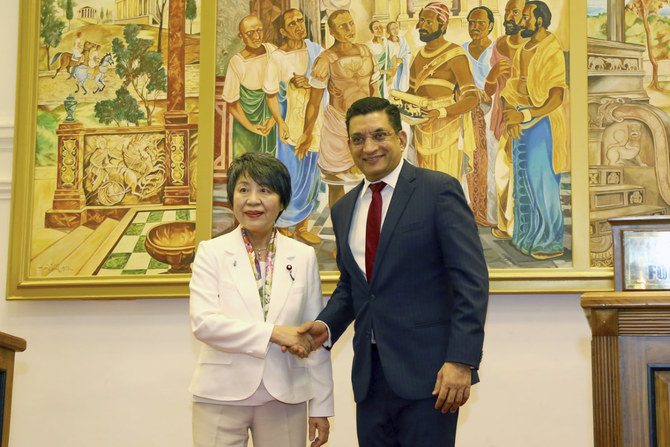
- Colombo has handed over to a Chinese firm a deep sea port built on a huge China loan after failing to pay
- Colombo defaulted on its $46 billion external debt in April 2022 and has failed to finalize any deals with foreign creditors so far
COLOMBO: Strategically placed Sri Lanka’s economic recovery was essential for stability in the Indo-Pacific region, Japan’s foreign minister said Saturday, urging Colombo to swiftly restructure its foreign debt.
Yoko Kamikawa said after talks with her Sri Lankan counterpart that Colombo should secure agreements with bilateral lenders and international sovereign bondholders to unlock suspended foreign funding.
The Sri Lankan government which defaulted on its $46 billion external debt in April 2022 had hoped to finalize deals with foreign creditors by April but there have been no final agreements yet.
Kamikawa said she “stressed the importance of reaching a debt restructuring agreement with all the creditors,” including China — the largest bilateral lender to the island.
“I also conveyed Japan’s intention to further support Sri Lanka’s development by swiftly resuming existing yen loan projects (after a debt restructuring deal),” she said.
She said Tokyo considered Colombo’s economic recovery as crucial for the entire region. The island is located halfway along the main east-west international shipping route.
“The restoration of stability and economic development of Sri Lanka, which is at a strategic location in the India Ocean, is essential for the stability and prosperity of the entire Indo-Pacific region,” she added.
Sri Lanka must secure agreement from all official creditors and a majority of private bondholders to continue with a four-year $2.9 billion bailout loan begun since March last year.
Japan, the second largest bilateral lender to the island has expressed concern about China’s big infrastructure projects in Sri Lanka and elsewhere in the region.
Tokyo maintains that the Chinese-funded projects did not meet international finance standards.
Unable to repay a huge loan taken from China in 2017 to build a deep sea port in southern Hambantota, Sri Lanka handed it over to a Chinese firm for $1.12 billion on a 99-year lease.
Sri Lanka ran out of cash to pay for even the most essential imports in 2022, leading to chronic shortages of food, fuel and medicines.
Then-president Gotabaya Rajapaksa, who faced allegations of mismanagement and corruption, was forced to flee the country and resign in July 2022 after months of protests.
His successor, Ranil Wickremesinghe has raised taxes, cut subsidies and is enforcing painful economic reforms in line with the IMF bailout.



